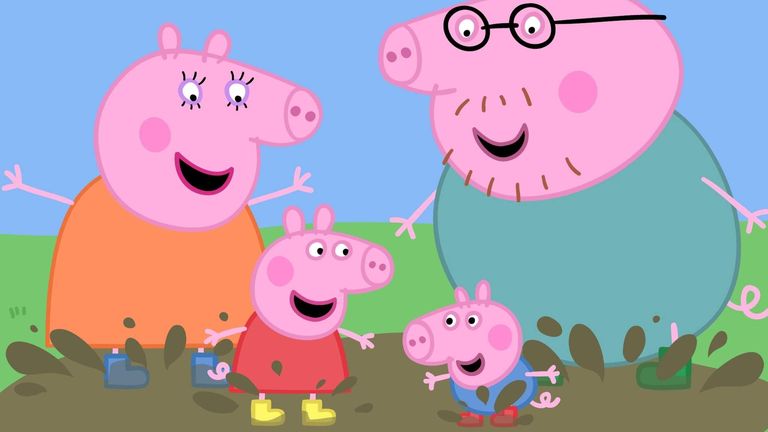Shared Parental Leave? Even in Peppa Pig, Daddy Pig is the one who works
Many fathers say they want to spend more time with their children so why aren't more taking advantage of paternity leave?
Tuesday 20 March 2018 15:43, UK
A new report by the Women and Equalities Committee says the law must be reformed to give fathers 12 weeks' leave in their child's first year, higher paternity pay and rights to more flexible work.聽
MPs say men want to take a more active parenting role, but the law currently blocks it.
Jeremy Davies from the Fatherhood Institute tells Sky News why so many men don't feel able to take up paternity leave.
Britain's dads already want to spend more time with their children. The last thing they need is a hashtag to persuade them to do so.
The Government's #sharethejoy campaign, which urges more dads to take time off as shared parental leave, shows how out of touch the Government is with the realities of modern family life.
Men aren't taking significant chunks of time off work when they become fathers - not because they don't want to, but because they can't afford to.
The Women and Equalities Committee's report on Fathers and the Workplace recognises this, and shows in spades that the UK's infrastructure for supporting new parents is no longer fit for purpose.
The gap between mothers' and fathers' entitlements to parenting leave is wider in the UK than anywhere else in the developed world. Mums can take 52 weeks' maternity leave (albeit mostly on low or no pay); men get just two weeks' paternity leave.
Shared parental leave, launched against that backdrop in 2015, has been a damp squib. Why? Because really it's just transferable maternity leave - so it's still built on the concept that mums should be "in charge" of looking after the baby, the same belief that underpins our unacceptably high levels of pregnancy discrimination and the gender pay gap.
Most families can't afford to share the leave anyway (even if they're eligible) because employers don't have to offer the same pay for dads on shared parental leave as they do to mums on maternity leave. Add to that the fact that many employers don't promote the system, and certainly don't clarify to men that it's an option, and it's not hard to see why take-up has been so pathetic.
Parenting leave isn't the only problem we dads face, of course.
There are lots of ways in which British culture fetishises motherhood and relegates dads to the status of secondary parents.
It's 2018 and our leading high street retailer of baby clothes and equipment is still called Mothercare.
Parenting books aimed at dads have patronising titles like The New Dad's Survival Guide, Pacify Me and Dude, You're Gonna Be A Dad.
TV shows like Motherland, adverts and children's books portray fathers as hapless fools.
In Peppa Pig, for example, Daddy Pig is the one who makes mistakes while Mummy Pig is in the background sorting everything out.
And publicly-funded services continue to view fathers as an afterthought, providing services designed for and promoted only to mothers, despite the mountains of evidence showing how important fathers can be, both for child outcomes and in terms of their impact on mothers, not to mention how useful fathers themselves might find some external support.
It's still common for men entering children's centres and nurseries to be looked at as if they're an alien - and for the very few men who dare to get jobs in such settings to suffer unfounded assumptions that they are closet paedophiles.
Only last year Andrea Leadsom, the then candidate for Prime Minister, the highest office in our land, went on record with claims that it would be "cautious and sensible" to not employ a male nanny.
So it's refreshing that the WEC report recognises the obstacles that currently block dads from greater involvement - and proposes ways of shifting the balance, including more (and, crucially, better-paid) time-off for men when they become fathers.
Research shows that three months' well paid, use-it-or-lose-it fatherhood leave in the first year (as the WEC recommends) could have a huge impact.
It would equalise roles at home, transform fathering, boost children's outcomes, and improve parental relationships, leading to higher couple satisfaction and lower rates of separation.
And because the change begins to put men and women on similar footings at work, it would challenge pregnancy discrimination and the gender pay gap.
Let this be the start of the UK's next gender revolution. For dads and mums alike, it's long overdue.






